15-2. Could a ferocious Shark
be a kind of adaptation from the ferocious Wolf north of
the equator?
 |
 |
 |
 |
|
Eb5-25
(326 + 174 = 500) |
Eb5-26 |
Eb5-27 |
Eb5-28 (354 / 2)
|
|
e tamaiti |
nuku maro etoru |
kua puoko i te haú ia |
te henua - te kiore |
|
Tama. 1. Shoot
(of plant), tama miro,
tree shoot; tama tôa,
shoot of sugarcane. 2.
Poles, sticks, rods of a
frame. 3. Sun rays. 4. Group
of people travelling in
formation. 5. To listen
attentively (with ear,
tariga, as subject, e.g.
he tama te tariga);
e-tama rivariva tokorua
tariga ki taaku kî,
listen carefully to my
words. Tamahahine,
female. Tamahine (=
tamahahine), female,
when speaking of chickens:
moa tamahine, hen.
Tamâroa, male. Vanaga.
1. Child. P Pau.: tama
riki, child. Mgv.:
tama, son, daughter,
applied at any age. Mq.:
tama, son, child, young
of animals. Ta.: tama,
child. Tamaahine (tama
1 - ahine), daughter,
female. Tamaiti,
child P Mq.: temeiti,
temeii, young person.
Ta.: tamaiti, child.
Tamaroa, boy, male. P
Mgv.: tamaroa, boy,
man, male. Mq.: tamaóa,
boy. Ta.: tamaroa,
id. 2. To align. Churchill.
In the Polynesian this [tama
na, father in the Efaté
language] is distinguished
from táma child by
the accent tamā
or by the addition of a
final syllable which
automatically secures the
same incidence of the
accent, tamái,
tamana
... Churchill 2 |
|
ε Andromedae (8.2), DELTA = δ Andromedae (8.4), SCHEDIR (Breast) = α Cassiopeiae
(8.6), ζ Andromedae, μ
Phoenicis (8.9)
*8.4 - *41.4 = *149.0 -
182.0 =
- *33.0 |
ξ
Phoenicis (9.0),
ρ
Tucanae (9.1),
DENEB KAITOS (Tail of the
Sea Beast) =
β
Ceti,
η Phoenicis (9.4),
AL NITHĀM (String of Pearls)
=
φ¹
Ceti
(9.6)
*9.4 - *41.4 = *150.0 -
182.0 =
- *32.0 |
ACHIRD (Woman with Luminous
Rays) =
η
Cassiopeiae
(10.7) |
Legs-15 (Wolf)
ν
Andromedae (11.0), φ²
Ceti (11.1),
ρ
Phoenicis
(11.2),
η
Andromedae (11.4)
*335.0 = *11.4 - *41.4 |
|
Sept 27 (270 = 266 + 4) |
28 |
29 |
30 (3 * 91 = 273) |
|
March 29 (88 = 84 + 4) |
30 (365 + 89 = 454) |
31 |
April 1 (91 = 456 - 365) |
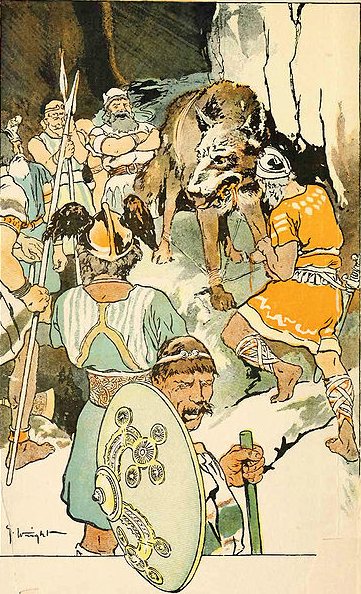
... At
the beginning of 44 B.C. -
when Ceasar was still alive
- the Senate decided to
raise statues of him in all
the temples and to sacrifice
to him on his birthday in
the month Quintilis,
which in honour of him was
renamed July. He was raised
to the status of a god
(among the other gods of the
state) under the name
Jupiter Julius. Marcus
Antonius, who this year was
consul together with Ceasar,
became high priest and
responsible for the
ceremonies. In the middle of
February, at the time of the
old feast of Lupercalia,
he ran around naked (except
for a girdle), and whipped
the Roman ladies with thongs
made from goat-skin [februa],
in order to promote their
fertility
...
The word Lupercalia
ís Latin and refers to an
ancient feast held in
February 15. Lupus is
Latin for Wolf. The Chinese
Legs station which
pointed at a Wolf
happens to be number 15.
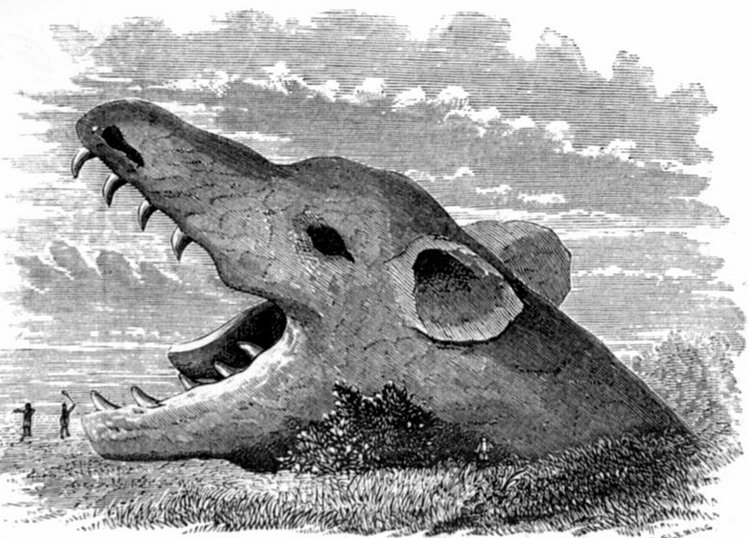
In order to
be able to walk on dry land
it is necessary to have
Legs. |
Perhaps te maro etoru should be read as the 3rd of
June. We could then count June 3 (153) - 89 (March 30) = 64.
Since the time of the Golden Bull the stars had been carried
ahead with 64 right ascension days:
|
 |
|
ξ
Phoenicis (9.0) |
π¹ Orionis (73.0)
|
|
March 30 |
MARCH 30 |
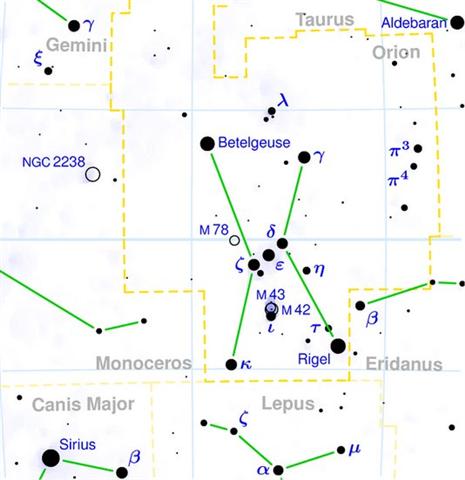
In the last night of September the Full Moon ought ideally
be visible at Φ Ceti,
corresponding to where the Sun should be in the first day of
April.
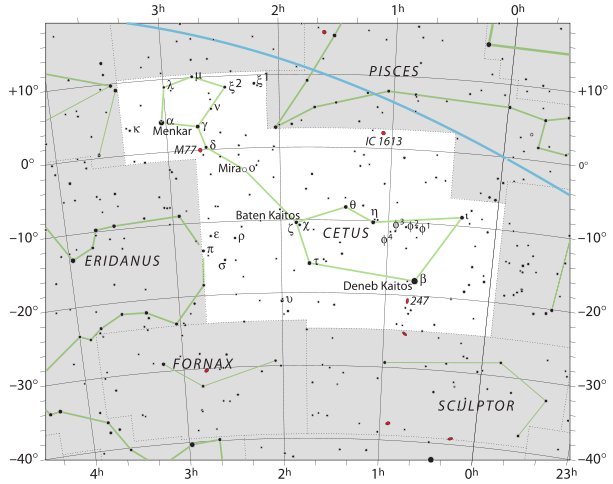
|
Egyptian bread, (-t, female determinant) |
 |
Phoenician qoph |
 |
Greek
phi |
Φ(φ) |
|
... is the 21st letter of the
Greek alphabet ... Its origin is uncertain but
it may be that phi originated as the letter
qoppa ... In traditional Greek numerals, phi has
a value of 500 or 500000 ...
Isaac Taylor, History of the Alphabet:
Semitic Alphabets, Part 1, 2003: 'The old
explanation, which has again been revived by
Halévy, is that it denotes an 'ape,' the
character Q being taken to represent an
ape with its tail hanging down. It may also be
referred to a Talmudic root which would signify
an 'aperture' of some kind, as the 'eye of a
needle,' ... Lenormant adopts the more usual
explanation that the word means a 'knot' ...

... The king, wearing now a short, stiff archaic
mantle, walks in a grave and stately manner to
the sanctuary of the
wolf-god Upwaut, the 'Opener of the Way',
where he anoints the sacred standard and,
preceded by this, marches to the palace chapel,
into which he disappears. A period of time
elapses during which the pharaoh is no longer
manifest.
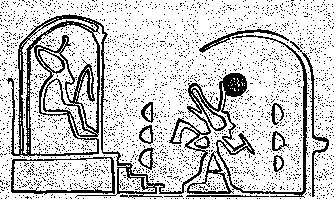
When he reappears he is clothed as in the Narmer
palette, wearing the kilt with Hathor
belt and bull's tail attatched. In his right
hand he holds the flail scepter and in his left,
instead of the usual crook of the Good Shepherd,
an object resembling a small scroll, called the
Will, the House Document, or Secret of the Two
Partners, which he exhibits in triumph,
proclaiming to all in attendance that it was
given him by his dead father Osiris, in
the presence of the earth-god Geb. 'I
have run', he cries, 'holding the Secret of the
Two Partners, the Will that my father has given
me before Geb. I have passed through the
land and touched the four sides of it. I
traverse it as I desire.' ...
.jpg) |
And the first glyph in line Eb6 has for a long time drawn my
attention, because it is similar in design to what we can
see at the hole in
the ancient black (ebenholz) Egyptian Den Tablet:
Mata. 1. Tribe, people; te mata tûai-era-á,
the ancient tribes. 2. Eye; mata ite, eyewitness. 3.
Mesh: mata kupega. 4. Raw, uncooked, unripe, green,
matamata, half-cooked, half-ripe. Kahi matamata,
a tuna fish. Vanaga. 1. The eye; mata neranera,
mata kevakeva, mata mamae, to be drowsy; mata
keva, mataraparapa, matapo, blind; mata
hakahira, squint eyed; mata pagaha, eye strain.
2. Face, expression, aspect, figure, mien, presence, visage,
view; mata mine, mata hakataha, mata pupura,
mata hakahiro, to consider. 3. Raw, green, unripe. 4.
Drop of water. 5. Mesh; hakamata, to make a net. 6.
Cutting, flint. 7. Point, spear, spike (a fish bone). 8.
Chancre. Matamata, sound of water. Churchill. There
is a wide range of significations in this stem. It will
serve to express an opening as small as the mesh of a net or
as large as a door of a house; it will serve to designate
globular objects as large as the eye or as small as the bud
on a twig or the drop of rain, and designating a pointed
object it answers with equal facility for the sharpened tip
of a lance or the acres of a headland; it describes as well
the edge of a paddle or the source from which a thing
originates. Churchill 2. Matá. Black obsidian spear
points, all belonging to the Late Period which began ca
1680. Heyerdahl 3.
 |
 |
 |
 |
 |
 |
|
Eb5-29 (178) |
Eb5-30 |
Eb5-31 |
Eb5-32 |
Eb5-33 |
Eb5-34 |
|
e manu gao takoa |
e manu kake rua |
te tagata |
e Rei vage Rei |
manu |
tagata |
 |
 |
 |
 |
|
Eb5-35 |
Eb6-1 (185) |
Eb6-2 |
Eb6-3 |
|
Kua pipiri te hetu |
ko te mata no te henua |
to ihe - te maro |
tara |
 |
 |
|
Eb6-4 |
Eb6-5 |
|
ihe Rei |
kupega no te niu |
 |
 |
 |
|
Eb6-6 |
Eb6-7 |
Eb6-8 |
|
te tagata |
te rima haga rave hia |
te kava - te rakau |
 |
 |
 |
 |
 |
 |
 |
|
Eb6-9 |
Eb6-10 |
Eb6-11 |
Eb6-12 |
Eb6-13 |
Eb6-14 |
Eb6-15 |
|
to ihe |
te ariki |
te kai - te manu |
haú hia |
te tagata |
hakatu i te toga |
kua tupu te kihikihi |
 |
 |
 |
|
Eb6-17 |
Eb6-18 |
Eb6-19 |
|
ka hakatu ma te rima |
hakapeka hia te
tagata |
kiore - henua |
The Opener of the Way (ancient Egyptian Upwaut) was a
Wolf-god and Rome was said to have been founded by the twins
Romulus and Remus:

On the other hand, the Sea-beast
Cetus seems to be a more likely candidate for a Shark
Walking on Land, because he has legs up in front
where the Eridanus river makes a bend,
creating a piece of land
for Cetus to climb up onto:
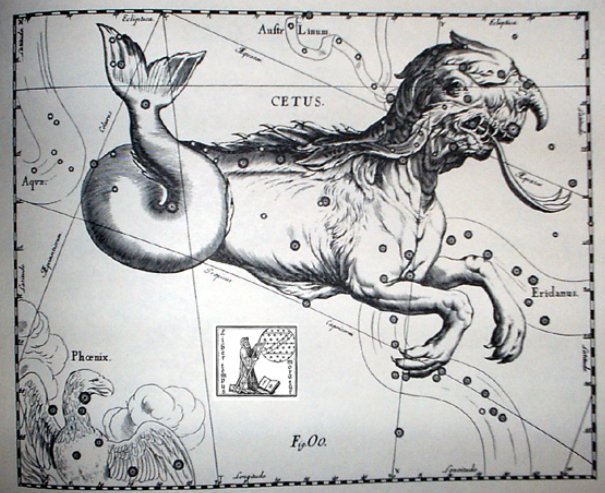
|







.jpg)











